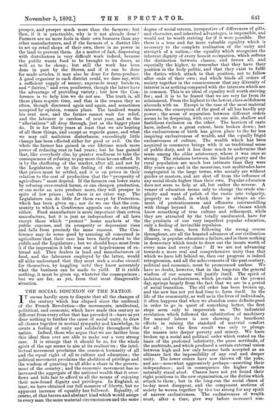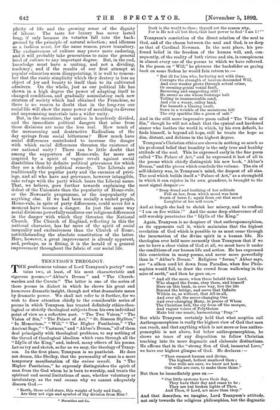THE SOCIAL DISUNION OF THE NATION.
IT seems hardly open to dispute that all the changes of the century which has elapsed since the outbreak of the French Revolution—the movements, intellectual, polititical, and economic, which have made this century so different from every other that has preceded it—have as yet done nothing to further the cause of social unity, to draw all classes together in mutual sympathy and knowledge, to create a feeling of unity and solidarity throughout the nation. Indeed, those who argue that we are farther from this ideal than ever are able to make out a very strong case. It is strange that it should be so, for the whole spirit of the age seems to aim at its realisation ; the intel- lectual movement proclaims the common humanity of all and the equal right of all to culture and education ; the political movement proclaims the abolition of privilege and the wisdom of granting to all alike a share in the govern- ment of the country ; and the economic movement has so increased the aggregate of the national wealth that it over- flows and bids fair to afford to all the means of enjoying their new-found dignity and privileges. In England, at least, we have obtained our full measure of liberty, but no apparent increase of equality has followed. Equality, of course, of that barren and abstract kind which would assign to every man the same material circumstances and the same I degree of social esteem, irrespective of differences of gifts, and character, and inherited advantages, is impossible, and would not be worth striving for if it were possible. But there is a true and far more valuable equality which is necessary to the complete realisation of the unity and strength of a nation,—the equality which recognises the inherent dignity of every honest occupation, which softens the distinction between classes, and forces all, and especially the higher, to remember that they have their position in the body politic, and that they exist to fulfil the duties which attach to that position, not to follow after ends of their own ; and which binds all orders of society together in the consciousness that any diversity of interest is as nothing compared with the interests which are in common. This is an ideal of equality well worth striving for ; and it is to be feared that we are very far from its attainment. From the highest to the lowest, class-selfishness abounds with us. Except in the case of the most material interests, the conception of the good of all has hardly any power ; the sense of separation between different orders seems to be deepening, with envy on one side, shallow and fastidious exclusion on the other. The barriers of caste have, indeed, to a great extent, been broken down ; but the exclusiveness of birth has given place to the far less inspiring exclusiveness of wealth, and the equally frigid exclusiveness of culture. The wealth which has been acquired in commerce brings with it no traditional sense of public duty, and it has done much to undermine that sense among the older aristocracy, where it was once so strong. The relations between the landed gentry and the rural population are much less intimate than they were fifty years ago ; and in the meantime, vast multitudes have congregated in the large towns, who socially are without guides or masters, and are shut off from the influence of any social ideals higher than their own. Popular education does not seem to help at all, but rather the reverse. A veneer of education seems only to change the crude sim- plicity and want of polish of the rustic into vulgarity, properly so called, in which there is always an ele- ment of pretentiousness and offensive intermeddling with things beyond it. And hence the classes which know something of true culture and refinement, while they are attracted by the totally uneducated, have for the products of our very imperfect popular education, only a feeling of invincible repulsion.
Have we, then, been following the wrong course throughout, are all the boasted advances of our civilisation illusory, is popular education a failure, and is there nothing in democracy which tends to draw out the innate worth of every man and every class ? If we are not advancing towards a more real and comprehensive unity than that which we have left behind us, then our progress is indeed retrogression, and all the achievements of the past century, political and economic, must be pronounced useless. We have no doubt, however, that in the long-run the general wisdom of our course will justify itself. The spirit of isolation and exclusiveness, which prevails at the present day, springs largely from the fact that we are in a period of social transition. The old order has been broken up, and the new has not yet had time to form itself. In the life of the community, as well as in the lives of individuals, it often happens that when we abandon some definite good in order to go in quest of something better, the first steps seem only to impoverish us. The industrial revolution which followed the substitution of machinery for manual labour is now showing its beneficent effects in raising the standard of material comfort for all ; but the first result was only to plunge the masses into deeper poverty and misery. We have broken up a social and political order which rested on the basis of the profound inferiority, the quasi servitude, of the multitude, and which produced a certain external union between high and low only because both accepted as an ultimate fact the impossibility of any real and deeper unity. The lower orders have now thrown off the yoke, and are—somewhat aggressively perhaps—asserting their independence; and in consequence the higher orders naturally stand aloof. Classes have not yet found their right positions in the new organisation, or the duties which attach to them ; but in the long-run the social chaos of to-day must disappear, and the component sections of society be woven together by ties too strong for any spirit of narrow exclusiveness. The exclusiveness of wealth must, after a time, give way before increased aim- plicity of life and the growing sense of the dignity of labour. The taste for luxury has never lasted long, if only because its votaries fall into the back- ground by the principle of natural selection; and idleness as a fashion must, for the same reason, prove transitory. The exclusiveness of culture may prove more enduring, and it will probably take generations to raise the general level of culture to any important degree. But, in the end, knowledge must have a uniting, and not a dividing, tendency ; and if the results of our first attempt at popular education seem disappointing, it is well to remem- ber that the rustic simplicity which they destroy is less an object of joy and beauty to itself than to its cultivated admirers. On the whole, just as our political life has shown in a high degree the power of adapting itself to changed conditions, and gradually assimilating each new stratum of society which had obtained the Franchise, so there is no reason to doubt that in the long-run our social life will show the same power of moulding its diverse and unpromising materials into a wider unity.
But, in the meantime, the nation is hopelessly divided, and the immediate political dangers that 'arise from these divisions are none the less real. How much of the unreasoning and destructive Radicalism of the day springs from social bitterness ? How much have social differences contributed to increase the danger with which racial differences threaten the existence of our national unity ? There can be little doubt that among the supporters of Home-rule, far more are inspired by a spirit of vague revolt against social disabilities than by definite political grievances for which they see a definite political remedy. The Liberals are traditionally the popular party and the enemies of privi- lege, and all who have any grievance, however intangible, take refuge with the party which bears the Liberal name. That, we believe, goes further towards explaining the defeat of the Unionists than the popularity of Home-rule, or the Newcastle programme, or the unpopularity of anything else. If we had been socially a united people, Home-rule, in spite of party differences, could never for a moment have become a danger. In just the same way social divisions powerfullyreinforce our religious differences in the danger with which they threaten the National Church. The Church of England, reflecting in this the national character, has far more of the spirit of social inequality and exclusiveness than the Church of Rome, notwithstanding the absolute constitution of the latter. Here, however, a great improvement is already apparent, and, perhaps, as is fitting, it is the herald of a general improvement throughout the fabric of our social life.























































 Previous page
Previous page